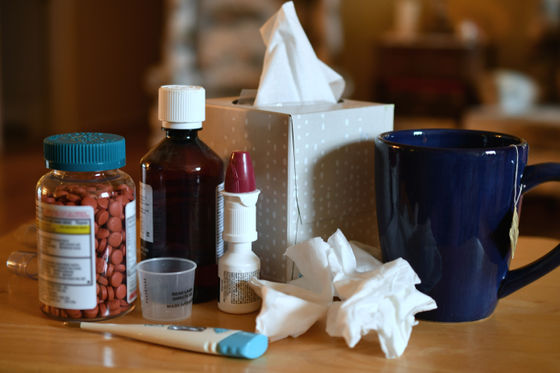Experts explain how to recover from the flu quickly

It is said that one in ten people in Japan is
How to get better faster when you have the flu, according to science | Live Science
https://www.livescience.com/health/flu/how-to-get-better-faster-when-you-have-the-flu-according-to-science
The best solution is 'antiviral drugs'
'The primary way to shorten the length of time you get the flu is to take antiviral medications -- drugs specifically designed to help your body fight viral infections,' says Timothy Brewer, a professor of medicine and epidemiology at the University of California, Los Angeles.
To date, the U.S. Food and Drug Administration (FDA) has approved Tamiflu (oseltamivir) , Relenza (zanamivir) , Rapiba (peramivir) , and Xofluza (baloxavir) as antiviral drugs for treating influenza.
According to the Ministry of Health, Labor and Welfare, in addition to these, Inavir (laninamivir) and Symmetrel (amantadine) are also used to treat influenza in Japan.

Perhaps the best-known flu treatment, Tamiflu, is an oral medication approved for use in people who are at least two weeks old and have had flu symptoms for less than two days.
Tamiflu works by blocking an enzyme that allows influenza to multiply in the body, but that enzyme is involved in both the main types of influenza, Type A and Type B. This means that Tamiflu is effective against both types of influenza.
Flu symptoms typically last a week, but clinical trials have shown that Tamiflu can speed up recovery from the flu by about a day compared to a placebo. 'We have good evidence that if you start taking Tamiflu within two days of symptoms starting, the drug will shorten the duration of your illness,' Brewer said.
The Centers for Disease Control and Prevention (CDC) also recommends that patients hospitalized with influenza be immediately given antiviral medications such as Tamiflu, and studies have shown that patients who receive Tamiflu upon admission to hospital may be 40% less likely to die than those who receive it a few days later.
Unlike Tamiflu, which is taken orally, Relenza is an inhaled medication, and Rapibu is an injected medication. Also, Xofluza is only available for patients aged 5 years and older. There is also evidence that these medications shorten the duration of flu symptoms by about one day.
◆How effective are cold prevention supplements?
Some people try to treat the flu with supplements such as vitamin C and zinc, or the herb
Many studies have focused on these non-pharmaceuticals primarily targeting cold symptoms, which are also respiratory illnesses like influenza, but while colds are caused by a variety of viruses, influenza is caused only by the influenza virus.

'Obviously taking vitamin C is a good idea, but as far as I know there's no evidence that it helps with the flu,' Brewer said. 'Some people try zinc, but again there's no clear evidence that it affects the duration of the flu.'
About the effectiveness of over-the-counter drugs
According to Richard Zimmerman, a professor of family medicine and clinical epidemiology at the University of Pittsburgh, there are over-the-counter products available that can treat flu symptoms, although they don't address the underlying cause of the flu.
For example, pain relievers and fever reducers such as acetaminophen and ibuprofen can help relieve flu symptoms.
Aspirin is a common pain reliever and fever reducer, but when taken by children or teenagers with a viral illness, there is a small risk of developing Reye's syndrome , a fatal disease that causes brain swelling and liver damage.
Although the exact cause of Reye's syndrome is unknown, there is a clear drug link, so aspirin should not be given to anyone under the age of 19 unless directed by a doctor.
Also, honey has a pretty good track record as a cough suppressant, Zimmerman points out.
Research results: 'Honey is more effective against colds than over-the-counter drugs and antibiotics' - GIGAZINE

However, honey should never be given to children under one year of age due to the risk of infant botulism, as honey may be contaminated with spores of Clostridium botulinum, the bacteria that causes botulism, and infants' immune systems are not yet mature enough to fight them off.
◆Are vaccines also effective as treatments?
Although shortening the infectious period and alleviating symptoms are important, the most important thing is to prevent influenza infection. Influenza vaccination can reduce the severity of infection if you do become infected, and it can also reduce the risk of developing serious complications such as severe pneumonia that can lead to hospitalization or death.
However, while the vaccine can prevent influenza, it is not effective in treating it. This is because it takes about two weeks for immunity to develop after vaccination. Therefore, experts recommend getting a flu shot in September or October before the influenza epidemic begins in earnest.
Brewer also said, 'Basically anything that helps maintain a healthy immune system -- eating a nutritious diet, getting enough sleep and hydration, not smoking -- can reduce your risk of getting severe influenza.'
If you do end up getting the flu, antiviral medications are your best bet for shortening the duration of your illness.
Related Posts:
in Free Member, Science, Posted by log1l_ks






